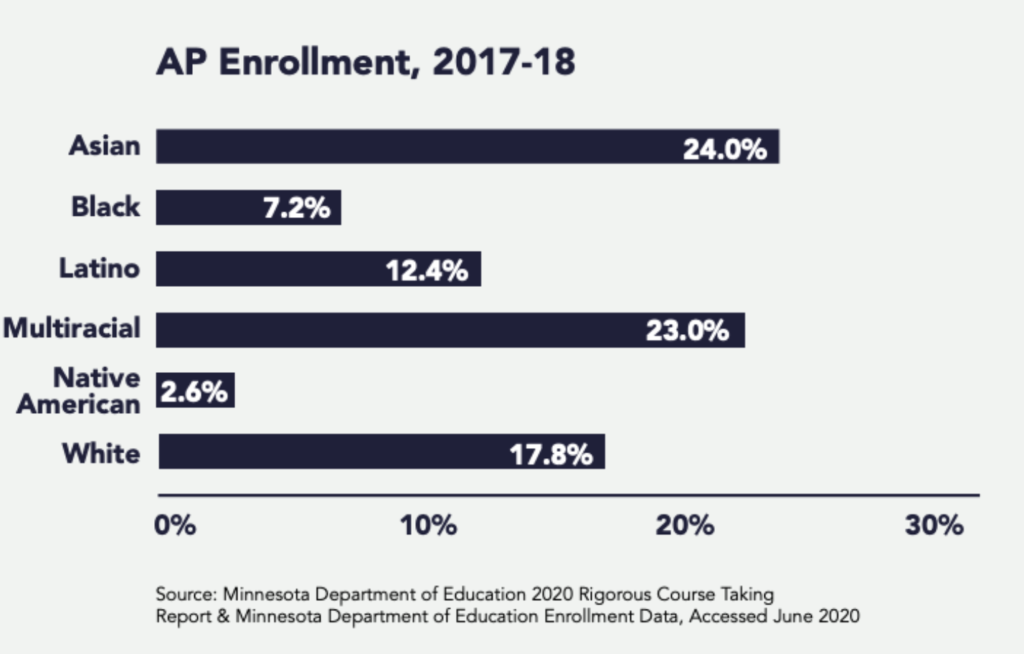Make Rigorous Education the Default through Automatic Enrollment
By Krista Kaput
Students of color experience inequitable access to advanced coursework opportunities around the country—for example, being placed in remedial math instead of an advanced math course like Algebra 1 or Honors. To combat this, over the past couple of years, four states—Colorado, Nevada, North Carolina, Washington—have passed policies that aim to prevent students from falling through the cracks through what’s known as “automatic enrollment,” and they are about to be joined by Illinois. Minnesota could make real progress on increasing college and career readiness by following suit.
What is an Automatic Enrollment Policy?
Often, when students reach middle and high school, they have more options for rigorous coursework—Advanced Placement, International Baccalaureate, concurrent enrollment, Postsecondary Enrollment Options, honors, and more. However, there are often disparities in who is enrolled in these advanced courses along lines of race and ethnicity. This does not necessarily reflect students’ academic potential and exacerbates opportunity gaps.
An automatic enrollment policy—also referred to as an acceleration policy—aims to eliminate a layer of bias from the process by defaulting students into the more rigorous course option if they meet or exceed standards on the annual standards-aligned state assessment in a particular subject area. For example, if a sixth-grade student is proficient on the math MCA, they would automatically be enrolled in the more advanced seventh-grade option.
Importantly, these types of policies reset the default, but they do not take away existing pathways. Students would still go through the usual course selection process, and can still enroll in the more advanced option based on measures like teacher recommendation or course grades. And a family can also choose to opt-out if they do not think the course is right for their student.
Washington: The Pioneer in Automatic Enrollment
In 2010, the Federal Way school district in Washington passed an automatic enrollment policy and immediately saw a large increase of the percentage of students of color who took an advanced course—from 35% in 2009-10 to 61% to 2010-2011, a 25 percentage point increase. Seeing the success of Federal Way, in 2013, the Washington state Legislature passed a bill that created the “Academic Acceleration Incentive Program” that encouraged districts to adopt an automatic enrollment policy through a grant program.
One of the districts that was an early adopter and took advantage of the pilot was Tacoma Public Schools—the state’s fourth-largest school district. Since implementing the policy, enrollment in advanced classes has more than doubled from 28% to 71% of students. While the change has helped increase enrollment for all student demographic groups, advanced course enrollment for students of color has tripled from 20% to 60%. According to the Tacoma Deputy Superintendent, Josh Garcia, “We’ve seen huge results in Tacoma with more kids taking these classes and these exams. And that corresponds with more kids graduating. And as those numbers go up, we have to remember that each one of those numbers is a kid.”
Building off the pilot’s success, in 2019, Washington passed another bill that mandated that by the 2021-22 school year all districts had to adopt an automatic enrollment policy for language arts, science, or mathematics after 8th grade. Senator Claire Wilson and vice-chair of the Senate Early Learning & K-12 Education Committee, explained her support for the bill, “I saw the dramatic benefits of academic acceleration firsthand when the policy was instituted while serving on the Federal Way School Board in 2011, and those benefits, particularly for scholars of color, have continued.”
Other States Where It’s Working
North Carolina: In 2018, North Carolina unanimously passed legislation requiring all students who score the highest level on their end-of-grade tests be automatically placed in an advanced math class the following year. In just one year, the Department of Public Instruction estimates that as many as 10,000 students were given access to advanced math courses they would otherwise not have had. And for 8th grade specifically, 2,100 students were enrolled into Math 1—which is typically taken in 9th grade—after having been originally placed in regular or remedial 8th-grade math.
In 2019, North Carolina strengthened the policy to require an annual report on policy implementation, clarify that advanced learning opportunities should be provided in grades 3-5, and directed the state department of education to provide implementation guidance to districts.
Colorado, Nevada, and Illinois: In 2019, Colorado passed a bill that created a grant program to incentivize automatic enrollment policies. The same year, Nevada passed a bill that requires schools to automatically enroll students in grades 3-12 in more rigorous mathematics, English, and social studies courses. And just last month, the Illinois Legislature sent a comprehensive education bill to the Governor that includes a provision on automatic enrollment. Led by the Illinois Legislative Black Caucus, the goal was to increase access and eliminate bias.
The Need for Automatic Enrollment Policies in Minnesota
In Minnesota, we know there are gaps in access to many types of programming, from gifted and talented to AP to concurrent enrollment—and this is only the tip of the iceberg. Right now, we can measure participation in specific programs, but due to a lack of statewide data, Minnesota doesn’t have universal, quality data on who takes part in remedial vs. honors, different math levels, and so on.
What we do know is stark: if students of color participated in the programs for which we have measures at the same rate as white students, this would equate to over 17,000 more students enrolled in these opportunities each year. As an example, the graph shows that the AP disparities are dramatic:

These enrollment gaps have significant consequences and need to be interrupted intentionally. Research has found that teachers, particularly white teachers, are more likely to have pre-determined negative implicit biases toward students of color, leading to lower rates of referral for rigorous courses. This has long-term implications. Students who take rigorous courses outperform their peers across a variety of academic measures, including academic achievement, college entrance exams, high school graduation, and college completion. Moreover, some programs give students the opportunity to earn college credit while they are still in high school, which can help them save time and money in college.
To ensure that more students can access and succeed in rigorous coursework, Minnesota should adopt an automatic enrollment policy.

